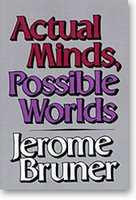Educational Technology and Life
Context-embedded, Inquiry-driven, and Collaborative Learning
Educational Technology and Life has moved:
Tuesday, January 24, 2006
Jerome S. Bruner, Actual Minds, Possible Worlds, and Educational Technology
Normally, Tuesday night at the Wagners' means watching arguably the best show on television. But, tonight Eva took her friend Nancy to a cooking class, so I had time for a long session of Walden, with time to spare for blogging...
 On Saturday I completed my whirlwind tour of Bruner's Actual minds, Possible Worlds and this evening I finshed blasting through The Culture of Education, much of which I slowed down for and read at normal speed. I enjoyed it much more than I expected, but as his newest work (and most explicitly culture related) I was not so surprised to find it may be the most significant of those I've read. (I also got a good deal out of The Relevance of Education, which I spent some time with tonight as well.)
On Saturday I completed my whirlwind tour of Bruner's Actual minds, Possible Worlds and this evening I finshed blasting through The Culture of Education, much of which I slowed down for and read at normal speed. I enjoyed it much more than I expected, but as his newest work (and most explicitly culture related) I was not so surprised to find it may be the most significant of those I've read. (I also got a good deal out of The Relevance of Education, which I spent some time with tonight as well.) Naturally, I found several excerpts in each that related to Educational Technology, particularly the read/write web and video games.
The following excerpt from Actual Minds, Possible Worlds captures a concept that should be central to the restructuring (or reinvention) of our educational systems and to the role educational technologies play in the future systems.
If [the student] fails to develop any sense of what I shall call reflective intervention in the knowledge he encounters, the young person will be operating continually from the outside in - knowledge will control and guide him. If he succeeds in developing a sense of self that is premised on his ability to penetrate knowledge for his own uses, and if he can share and negotiate the result of his penetrations, then he becomes a member of the culture creating community. (p. 132)And later:
The language of education is the language of culture creating, not of knowledge consuming or knowledge acquisition alone.Consider the role of the read/write web (and blogging in particular) in facilitating such "reflective intervention" as students process what they read (or experience), articulate their responses to it, and share these responses with a community of readers. More importantly, consider just how possible it is for our students to become members of a culture creating community. They are almost certainly doing that online (regardless of what we offer in schools) at places like My Space, where I'm sure a good deal of incidental learning is taking place... but as I am often advocating in my trainings, why not harness these technologies for intentional learning in formal education?
Incidentally, it's exciting that even students who are not strong in their linguistic intelligence can now participate via audio and video podcasts... or by photocasting images they've captured or created. I hope that early adoptors will not try to fit all students into the mold of a writer as they explore the power of blogs and the read/write web. I suppose I've caught a mild case of the "blogs are not a panacea" bug lately... despite my own personal drive to continue blogging in the face of serious time constraints.
In terms of the use of video games and simulations in education... at worst, there is a danger that students left alone with a game or simulation might indeed fail to develop the "reflective intervention" Bruner describes; they might indeed be controlled by the stimuli they encounter, rather than "developing a sense of self that is premised on [the] ability to penetrate knowledge." Aldrich and others (with Prensky being, at least at his most... humorous... a notable exception) advocate strongly for the importance of a teacher to help facilitate and mediate a student's experience with a game or simulation. After all, as Bruner interprets Vygotsky's work to suggest,
"conceptual learning [is] a collaborative enterprise involving an adult who enters into dialogue with the child in a fashion that provides the child with hints and props that allow him to begin a new climb, guiding the child in next steps before the child is capable of appreciating their significance on his own. It is the "loan of consciousness" that gets the child through the zone of proximal development. (p. 132)Naturally, at best (and I think this is what Prensky is getting at when he says things like we don't need teachers... or instructional designers), a game or simulation might actually be designed to provide some measure of this facilitation and mediation for the student-player.
0 Comments:
Post a Comment
<< Home